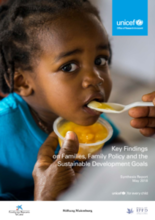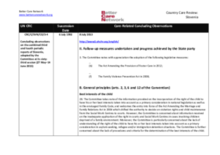Displaying 611 - 620 of 1796
This study compared the histories, circumstances and pathways of children receiving quasi-compulsory home-based support (under a child protection plan) to those for children ever placed in out of home care.
This synthesis report, ‘Families, Family Policy and the Sustainable Development Goals (SDGs): Key Findings’ explores how the role of families, and family policies from around the world, can contribute to meeting the SDG targets.
This review of the 91 English children's services departments with specific policies on bruising in premobile children found a major disjuncture between research evidence and its interpretation in guidance.
The authors of this study estimated the effect of household dysfunction (i.e., interparental violence, caregiver mental health problems, and caregiver substance abuse) on child maltreatment to understand how to advance the current framework of child welfare.
This country care review includes the care-related Concluding Observations adopted by the Committee on the Rights of the Child and the Committee on the Rights of Persons with Disabilities.
This Country Care Review includes the care-related concluding observations adopted by the Committee on the Rights of the Child and the Committee on the Rights of Persons with Disabilities, as well as other care-related concluding observations, ratification dates, and links to the Universal Periodic Review and Hague Intercountry Adoption Country Profile.
Data from extensive qualitative interviews (n = 67) and a survey instrument (n = 80) are used in this study to examine the perceived benefits experienced when organizations interact in community‐wide child welfare practice.
This country care review includes the care-related Concluding Observations adopted by the Committee on the Rights of the Child and the Committee on the Rights of Persons with Disabilities.
This country care review includes the care-related Concluding Observations adopted by the Committee on the Rights of Persons with Disabilities.
This is the report of the 3rd Biennial International Conference (3rd BICON) on “Evolving Trends in Alternative Care for Children in South Asia” that was convened by Udayan Care on March 16 & 17, 2018 at Amity University, Noida NCR (India).





